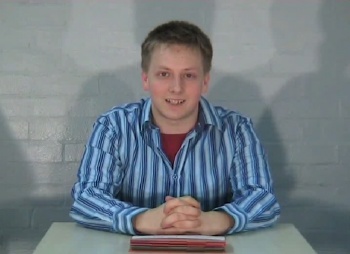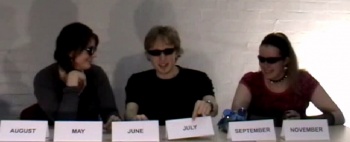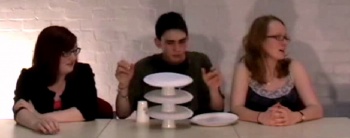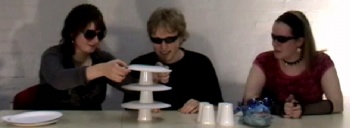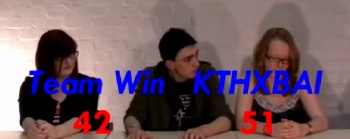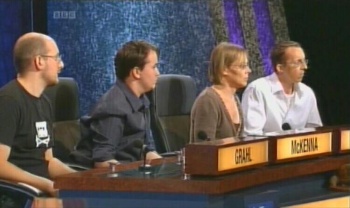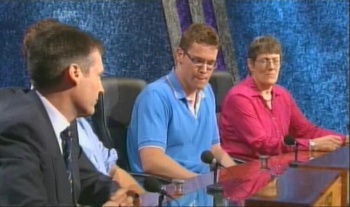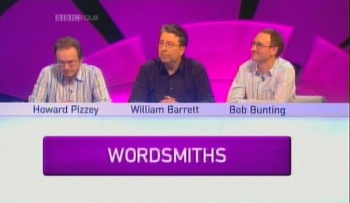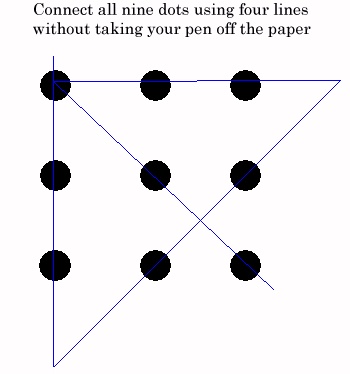Weaver's Week 2009-07-26
UKGameshows (Talk | contribs) |
m (1 revision) |
Revision as of 12:55, 22 December 2009
Last week | Weaver's Week Index | Next week
Perhaps the most bizarre game show recording we've ever attended was Hype, a programme produced by the Guild Television unit at Birmingham University. The recording took place in the drawing room of an old manor house that had been converted into student residences, and was filmed (for reasons that might have made sense at the time but certainly don't now) at two in the morning. We don't remember much of the format, other than it was an elimination quiz with the final prize round consisting purely of questions about alcohol. It wasn't the greatest show ever made, and producer Lizo Mzimba doesn't mention it all that often.
Contents |
Accumulate!
RUON, March 2009
| RUON is the university television network at Reading University (that's the university in the largest town in Berkshire, not a place where everyone's always got their nose in a book.) Some of the students have had the books surgically removed from the end of their noses, and have made some television shows. Some of them are even actually rather good.
Accumulate! begins with pictures of a spinning question mark over some mildly pompous original music. Goodness, didn't that title sequence turn up a few weeks later on BBC2's A Question of Genius? So it did. Any confusion between the two shows ends with the first sight of the host. While Kirsty Wark was pictured in the middle of the dot at the end of a question mark, Accumulate!'s host Daniel Peake is shown against a plain white wall. After a quick introduction to the teams, the quiz gets under way with only a little fuss. Round One consists of five questions on a subject. In the sample final we saw, the questions had something to do with the London Underground, and something to do with people who appeared on banknotes. The latter, in particular, is a surprisingly rich vein of trivia that we hadn't thought of tapping. The first question is worth one point, the second is worth two points, and so on until the final question is worth five points. Incorrect answers aren't handed across to the other team, just to spite them for choosing the wrong category. | |
| So far, so normal. Round two, Speculate to Accumulate!, is where things get interesting. The teams are given six pieces of card, and 45 seconds to arrange them in order to answer a question they've been set. For instance, in 2003, which months were most popular for marriages? The team plays by shuffling the bits of card around on the desk in front of them, a refreshingly tactile experience, and superior to Crisis Control's moving of words on a screen.
If the team can get the top answer (for instance, August was the most popular month, thanks to having five weekends), they'll earn one point; if they can get the second most popular answer, they get two points, and so on. Readers might recognise this scoring system as being a bit like that used on Topranko! back in the day. What Anthony Wilson never offered was a fake answer: one that was plausible but simply doesn't belong on the list. There are no points for correctly spotting the red herring. | |
| Round three, the Accumulatower, follows close behind. In this round, the team is given general knowledge questions for 90 seconds, which is entirely ordinary. There are no points awarded for correct answers, which is somewhat unusual. Instead, a correct answer allows the team to start building a tower out of plastic cups and paper plates. Put a cup on the table, put a paper plate on top of it. Put another cup on top of the plate, put another plate on top of it.
This column's non-resident cat took an instant shine to this round: not only is she brilliant at trivia, but she can build a cup-and-plate tower so high that it requires planning permission. Humans aren't quite so good at this challenge, so the host gives them one point for the first layer, two points for the next, and so on until they reach the top. But if the building is less good than our cat's, it's liable to fall over, and what's the point of a toppled tower? There's no point in a toppled tower, so there isn't so much as one point awarded. Almost inevitably, the quick-fire final round comes at the end. Super Accumulate! is a series of ten questions, each on the buzzers. The first question is worth one point, the second is worth two, and so on until the final question is worth ten points. However! There's a super catch for the speculative accumulator: an incorrect answer will cost a team that many points, and the other side gets a crack at the question. It's possible for a side very far behind to answer the last four questions correctly, scoop 38 points, benefit from a few incorrect interruptions, and glide to a most unexpected lead. Whichever side has the more points at the end of the round is declared the winner, and wins the week's mystery prize. Which, in the episode we saw, wasn't a mystery at all. | |
| Daniel Peake is the show's host, and with Gary Male, researched the questions. They include some regrettably good puns (one answer in the underground round enquired after that well-known mainline terminus busker Whitney Euston) and he presents with a natural wit and flair.
There may be a few technical limitations in the presentation of Accumulate! – the sound balance was all over the place, with the host far louder than the teams, and we might have liked to see some sort of backdrop behind the host and teams. Do students not pin curtains up on their walls for decorations any more? All of this is knocked into perspective by three observations. First, the show doesn't outstay its welcome. Accumulate! is a twenty-minute game, and it's completed in about twenty minutes. There's no needless dragging out of proceedings so that the television company can fill hours and hours of airtime with the least amount of content. The show comes in, makes its point, and leaves. It's not rushed, nor does it outstay its welcome. | |
| The second observation: the format is entirely sound. The object of Accumulate! is to accumulate points, and the further into a round the team goes, the more points they stand to accumulate. Each round is well-crafted, the questions are rich and varied, and the little themes play out well – each answer in the final round, for instance, was linked by a common thread, that of increasing military ranks.
And the final observation: everyone involved is clearly having a lot of fun. It's obvious when someone's heart isn't in their production – just watch some of the late episodes of Totally Saturday, when even the channel controller had said the show wasn't up to much. Though Graham Norton was as good as ever, there was just that certain little something missing from his performance. Not so for Accumulate!, where host and contestants are quite obviously enjoying themselves. The tower round, in particular, is an idea that is so obvious it's the sort of thing we'd expect from comedy geniuses like Dick and Dom. The show's website tells us that Accumulate! will return for a new series in the new academic year. We're rather looking forward to it. Interested readers may view the entire series via RUON's website. |
The Round Britain Quiz tribute question, for anyone who may have forgotten about it. "David and Tanya's route to 28. A different look – but the same colour – for a tubby scooter rider. Gone a round with Eva's boyfriend? There's gold in them thar Flame Spray Technologies." The answer comes a little later.
University Challenge
Heat 3: Loughborough v UCL
| Word of the week is "dilletante", someone who just dabbles in the arts. It's answered by University College London (UCL to all its friends), an institution that educated regardless of colour or creed. Thumper wheels out the legend of Jeremy Bentham, the embalmed don who still attends meetings. The first set of bonuses is on vanity number plates.
Loughborough gets off the mark with the second starter; they claim to be the first technical university in the country, and is perhaps best known for its sporting prowess – the side has won many trophies, and produced such graduates as Paula Radcliffe and Lord Sir Sebastian Coe. They're also very good at the biology of Alice in Wonderland. UCL gets a set of bonuses on famous people whose deaths were eclipsed by even more famous departures. It's a phenomenon known as "Solti", after the conductor Georg. The visual round goes on Wisden cricketers of the year, and UCL has a 70-45 lead. | |
| The lead never looks substantial on either side. Loughborough doesn't recall that, in area, 1 Wales = 1 Massachussetts, and is unable to guess the states matching Scotland and Northern Ireland. (For some reason, our spellchecker believes that 1 Wales = 1 Catchphrase. Best get Roy Walker to do some snake charming.) After getting their first twelve bonuses correct, UCL finally misses something, on science in the 1820s. The audio round is on blues singers, and UCL's lead is 110-85.
A question on web comic XKCD is answered by the mathematics student, and though it's still early in the second half, everyone has collected at least one starter. Loughborough aren't doing that well on the bonuses, but they're bettering UCL on the buzzers, and that puts them in touch, then in the lead. The second visual round is on David Cohen prizewinners, and the game is tied at 145-145. Remember the last Young Musician of the Year? We're impressed that anyone does. Loughborough gets the starter, the bonuses finally fall for them, and the side begins to pull away. We're impressed that Jack Grahl for UCL simply knew that "nighest" became "next". Loughborough's quality on the buzzer proved the key factor, and they win the game by 205-175. | |
| High quality performances by both sides, and had the bonuses fallen for Loughborough, they could easily have challenged for 250. UCL completed 19/27 bonuses with two missignals; Jack Grahl's three starters was the best individual contribution. Anne Jennings secured six starters for Loughborough, the side made 15/36 bonuses.
Next match: Clare Cambridge v Jesus Oxford | The repechage board:
|
Only Connect
Series 2, Episode 2: Mathematicians v Wordsmiths
| Cleaning out the intellectual plumbing this week are a team of young mathematics graduates and a team of mature wordsmiths, one of whom is leading a campaign against the misuse of reflexive pronouns. Shall we get into the argument about ossification of the English language as she is spoken? Let's not; there's a lexical conundrum at the end of the report.
Instead, let's point and titter in the general direction of the mathematicians, who convince themselves that "Kojak" is a palindrome, reading the same forwards as back. However, they do get definitions of the mathematical constant pi, and neither side gets the audio round on songs re-written from German – we can honestly claim three points there. The mathematicians could also have claimed three on a question about things with three lines, but a little timidity cost two points. It's 3-1 after the opening exchanges. Round two turns out to be pivotal: the mathematicians take a plunge on common road names, and not only are they happy to confess their knowledge of Thomas the Tank Engine to the millions viewing, but they say they were rehearsing just this question on the trip to The OC's sun-drenched studios. The wordsmiths strike back with vitamin deficiencies, but zig with "era" when the geological timeframe is "period". The mathematicians also ride their luck on international dialling codes, to lead 10-3. | |
| We're tempted to write "game over" in our book, but there are points in the Connecting Wall. Both grids were very tough this week – the wordsmiths mused around magazines and vice-presidents, but there's so much crossover that they're blindly guessing. The Mathematicians reckon there's plenty of time. Are they too young to remember Richard O'Brien contradicting that sentiment? They never get to grips with the grid, but their lead is only trimmed slightly, to 13-7.
The final round falls further in the mathematician's favour – Victoria suggests this might be because they're used to sending SMS messages, where (apparently) the elision of vowels is commonplace. Quest objects goes their way 3-1, famous newspaper headlines 2-0, peace prize winners 2-1, and social dances ends in a 0-0 draw. The mathematicians have a clear win, 20-9. But we're interested by the very last question, in which "STCSTSWNG" is "East Coast Swing", and not "West Coast Swing". Now, if we're being so pedantic as to win the trans-national prize for pointless pedanticness, we might point out that the "W" in "West" is making the vowel sound, "weh". But then we think a bit further, and find that the "Y" in "Only" is making the vowel sound, "ee". That it's taken seventeen editions to spot this proves just what an unimportant point it is; that it has come to our attention means we should mention it, get it out of our system, and move right along. |
This Week And Next
Move right along to the questions we introduced as, "And, just for good measure, this column's cockeyed tribute to Round Britain Quiz is back, leaving everyone punchdrunk even after they've seen the answer and had it explained to them."
Starting at the end, with "There's gold in them thar Flame Spray Technologies." Gold has the chemical symbol AU, put that in the capitalised letters to get F-AU-ST, Faust. "A different look – but the same colour – for a tubby scooter rider." The teletubby who rode the scooter was Po, who was coloured red. A different look might come from a mask, and Edgar Allan Poe wrote the horror classic "The Masque of the Red Death". "David and Tanya's route to 28." David Buxton and Tanya Buck were the two moles on seminal show The Mole, and moles travel by tunnel – in this case, a Tunnel 228. "Gone a round with Eva's boyfriend?" refers to the classic song "He Hit Me (And It Felt Like a Kiss)", written by Goffin and King after finding their babysitter had been abused by her boyfriend.
So, the sub-answers are Faust, Tunnel 228, The Masque of the Red Death, and It Felt Like a Kiss. The thread linking all four is that they're productions by the Punchdrunk theatre company, the last two of which have been seen by this column. The company specialises in converting unlikely spaces (an old office block, tunnels under Waterloo station) to interactive plays and artistic presentations. The shows are as large as The Crystal Maze, as intricately-detailed as The Mole, and share Interceptor's pervasive sense of menace. What Punchdrunk's installations are not are game shows; there are no winners or losers. This colum reckons that there is scope for a huge-scale interactive game in these richly-detailed environments, but we digress.
If victory is what you're after, head to the Royal Exchange Theatre in Manchester for "Everybody Loves a Winner", a theatre show about people who go to the bingo. It asks why people trust in luck, why they ask for external forces to change their life, and does this by demonstrating the points with a real game of bingo for real prizes of real money. Readers who like Deal or No Deal will appreciate the points; those of us who don't pray at Little Noely's Church of Chance will really appreciate the points. While in Manchester, we also dropped by the Urbis museum, where there's an exhibition of classic video games. It even includes a video clip of Dominik Diamond on Gamesmaster when he had hair. Admission is £3, allow an hour or so, and do note that other people who work in the building include Andy Crane.
Ratings for the week to 12 July show the BBC monopolising the podium, with Celebrity Masterchef (5.6m), Guesstimation (5.05m) and Total Wipeout (also 5.05m) picking up the spoils. Millionaire had 4.2m, Mock the Week 3m, and University Challenge just beat Big Brother, by 10,000 viewers in 2.5m. The usual routine on the digital channels: 900,000 for Come Dine With Me, 610,000 for Britain's Got Talent Us, and 480,000 for QI. Living had a good Monday night, with Four Weddings attracting 410,000 viewers, and Britain's Next Top Model ending its series with 395,000.
After the swathes of new shows in recent weeks, it's a quieter set of programmes this week. Gyles Brandreth is back with Knowitalls (BBC2, 6.30 weekdays), in which people try to impress with their knowledge of stuff. Golden Balls (5pm Monday, ITV except Scotland) returns, as does Just a Minute (Radio 4, 6.30 Monday).
To have Weaver's Week emailed to you on publication day, receive our exclusive TV roundup of the game shows in the week ahead, and chat to other ukgameshows.com readers sign up to our Yahoo! Group.


